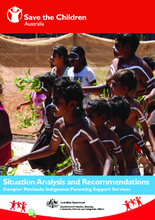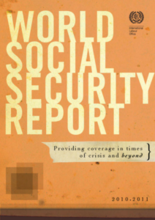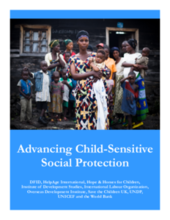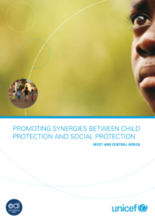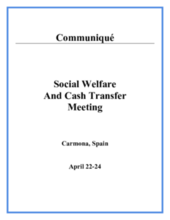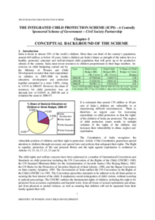Displaying 201 - 210 of 271
The first ever World report on disability, produced jointly by WHO and the World Bank, suggests that more than a billion people in the world today experience disability. This report provides the best available evidence about what works to overcome barriers to health care, rehabilitation, education, employment, and support services, and to create the environments which will enable people with disabilities to flourish. The report ends with a concrete set of recommended actions for governments and their partners.
This brief presents the results of the mid-term evaluation of the New Generation project - a three-year project comprised of two components: 1) A VSLA intervention involving the establishment of Village Savings and Loan Associations (VSLAs) and th
This report, published by Save the Children Australia, analyzes the situation of the parenting support services for Indigenous communities in the Dampier Peninsula of Australia.
Call for greater political and financial commitment to help build parents’ capacity to care for their children and to tackle the poverty and social exclusion that underlie many of the problems experienced by children and their families.
This report from the International Labor Organization is the first in a series of the World Social Security Reports whose chief aim is to present the results of regular statistical monitoring of the state and developments of social security in the world. It presents the knowledge available on coverage by social security in different parts of the world and identifies existing coverage gaps. It also examines the scale of countries’ investments in social security, measured by the size and structure of social security expenditure and the sources of its financing.
Short video illustrating the ways social protection safeguards children and their families – including those affected by AIDS – at every level from communities to entire countries and beyond.
Joint statement among UN agencies and NGO partners to build greater consensus on the importance of child-sensitive social protection.
Focuses on children’s vulnerabilities and risks related to an absence of protection from violence, abuse and neglect, and the ways in which measures to address such vulnerabilities and risks can be more effectively integrated into social protection policy frameworks in the West and Central Africa region.
Experts gathered in Carmona Spain to examine the results of policy relevant systemic reviews on social welfare and cash transfers. Meeting delegates explored the findings of reviews on integration of social welfare services and cash transfers in Ghana, Chile, Zimbabwe, Malawi and Kenya.
In 2006 the Indian Ministry of Women and Child Development proposed the adoption of an Integrated Child Protection Scheme (ICPS), which was adopted and launched by the central government in 2009-2010. Recognizing chronic under funding of child protection services in the country and major gaps in the system, the ICPS was expected to significantly contribute to the realization of Government/State responsibility by creating a system that would effectively and efficiently protect children.

